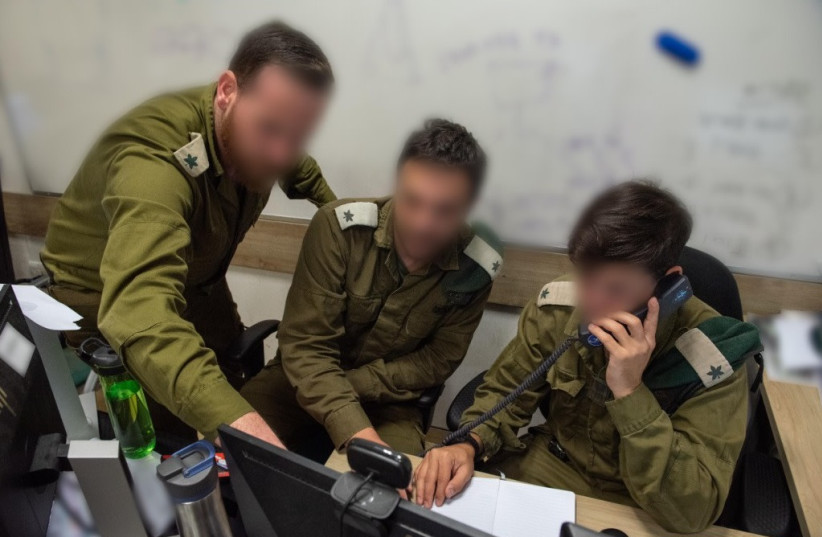
The year 2024 and the “day after” the Gaza war may mark the most radical change in the intelligence and defense establishments since the 1973 Yom Kippur War, according to numerous relevant sources across the spectrum consulted by The Jerusalem Post.
IDF Intelligence Chief Maj. Gen. Aharon Haliva is expected to be the first to resign mid-term over the failure to stop Hamas’s October 7 massacre, quite possibly in the near future.
Shin Bet Chief Ronen Bar is likely to follow. Early signs indicate that IDF Chief of Staff Lt.-Gen. Herzi Halevi will also step down mid-term.
If Halevi steps down, some other top generals might follow or be leap-frogged by lower generals for the top jobs, since the top generals may also be viewed as tainted by October 7.
In fact, the only top defense and intelligence chief likely to remain is Mossad Director David Barnea. The reason is that the Mossad technically had no responsibility for Gaza and practically had zero of its own assets there. Additionally, the Mossad is generally viewed as having been highly successful against Iran’s nuclear program and in thwarting terror attacks against Jews in dozens of countries across the globe.

Regarding Gaza, the biggest change for the IDF has already started to happen but will likely be further cemented in 2024.
IDF Unit 504 (the IDF’s Mossad) stopped operating spies in Gaza in 2012 when a decision was made to give the Shin Bet full control of human spying there. While military intelligence still spied on Gaza using aircraft, drones, sensors, and occasional missions or short-term undercover operations, human spying in Gaza was generally carried out by the Shin Bet. Instead, IDF Unit 504 focused on Lebanon, Syria, and other nearby areas.
Already on October 7, IDF Unit 504 moved back down to the South and shortly after started interrogating captured Hamas terrorists, as well as running newly recruited spies in Gaza. Within a short time, IDF Unit 504 had established a new facility for interrogation and spy recruitment near Gaza. That sub-unit within 504’s broader set of missions has ballooned in size and is expected to remain large even after the main war is over, deep into 2024 and beyond.
Unit 504 has also been used to evacuate [Gazan] civilians and to negotiate large group surrenders of Hamas forces. This means that besides spying and recruiting spies from Hamas and Islamic Jihad on sensitive issues, Unit 504 will also probably have a myriad of interactions with regular Gazans to keep a pulse on various evolving socioeconomic trends which could impact the security picture.
Part of what has been unclear during the war is where Unit 504’s responsibilities end and where the Shin Bet’s spying and interrogation responsibilities begin. It seems to be worked out on a case by case basis: whoever is closest and most available, whoever is less busy with some other interrogation or spying operation, and whoever is quickest to jump on the latest issue.
In a general sense, it can be said that the Shin Bet interrogators are not only viewed as more experienced (objectively speaking, they tend to be older and have served longer) but also to have more special skill sets for interrogations of detainees who can contribute to helping Israel’s strategic victory picture.
This can mean going after key military commanders, crucial military command centers, or top terror financiers as part of longer-term operations.
In contrast, IDF Unit 504 may be more focused on learning in a period of minutes or hours from a local terrorist where the closest ambushes around the block are located, so as to avoid them.
But all of this will need to be further ironed out in 2024 in terms of long-term visions, missions, and how to best build needed future staff for the relevant goals.
How spying in Gaza will be made much easier in 2024
For both the Shin Bet and IDF Unit 504, spying will be an easier game in Gaza in 2024 because no matter who takes over Gaza from Israel, Jerusalem is expected to maintain the right to conduct anti-terror raids as has been done at all times in the West Bank.
This will mean it will be much easier for Shin Bet recruiters to access Gaza and make approaches to potential spy recruits.
One question in all of this is whether the Mossad will also be given some kind of responsibility for Gaza so as to get a third pair of eyes on what is happening there on the ground. Will the government and the intelligence-defense establishment decide that bringing back IDF Unit 504 and a second set of eyes is enough, or will the Mossad also be brought in?
To date, the Mossad has not been brought into spying within Gaza but has been deeply involved in using its relationships in Qatar to try to negotiate the release of hostages from Hamas.
This would make it harder to inject the Mossad newly into Gaza, whereas IDF Unit 504, while “new” in the sense of only being back since October, is already firmly ensconced. It is often such bureaucratic realities that dictate outcomes more than anything else, especially since the Mossad already has its hands full with the rest of the world.
In addition, Prime Minister Benjamin Netanyahu, in a rare move, said publicly that he had given the Mossad the mission to assassinate top Hamas leaders anywhere in the world.
This likely means that the Mossad will form or has formed a special assassinations unit, like the one that went after terrorists connected to killing Israelis in Munich in 1972, and that significant new resources will be poured into that mission.
Of course, top Hamas officials have been killed before – in Tunisia, Malaysia, and elsewhere – with no clear fingerprints leading to the Mossad. But prior to those successes, the spy agency failed in its prior assassination attempt on still-operating Hamas official Khaled Mashaal, and in another case, while according to Hamas it did kill the organization’s official Mahmoud al-Mabhouh, the covers of many of its agents involved were permanently blown.
But all three organizations will wait to make their final recommendations on their new missions and staffing needs for 2024 until the current Gaza war ends or until it has clearly shifted into a low-intensity conflict mode.
All of this is without getting into the fact that the IDF and the government are likely, some time in 2024, to approve game-changing policies and legislation to lengthen both mandatory service and reservist service requirements to build a much larger standing army for at least the next several years.
This will include the need to post in some estimates as much as three times as many troops on both the Gaza and Lebanon borders (probably also in the West Bank and on the Syrian border, but these issues are not being discussed as much yet) as there were on October 7, even after the expected low-intensity conflict stage is over.
That stage is expected to last for half or all of 2024 and will see an even larger standing army than what will be expected the “day after” Israel fully hands Gaza over to some other third party or parties.
